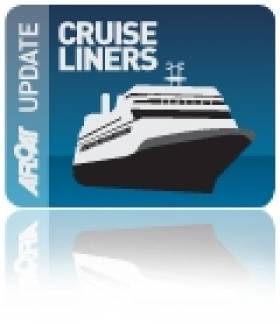Displaying items by tag: Chantiers d'Atlantique
Cunard Line Flagship Queen Mary 2 Calls to Cobh
The current liner (QM2) can carry 2,620 passengers and a crew of over 1,200 on a vessel is the longest, tallest and widest of any passenger liner built. The luxury liner has private balconies for nearly 80 per cent of cabins and has an art collection worth £3.5m. To complement these works of art there is the first 'floating planetarium', the largest library at sea, boasting 8,000 hardbacks and also the largest ballroom to grace a ship on the oceans.
Queen Mary 2 was short-listed to be built in Belfast at the Harland & Wolff shipyard, but the contract went to Chantiers d'Atlantique, St. Nazaire on the west coast of France.
Her first visit to Irish waters occurred when she anchored off Dunmore East in 2005, the liner had arrived overnight on a passage from her homeport of Southampton and was on a nine-day cruise of British, Irish and Baltic state ports.
Today's Cobh visit of the 345m long Queen Mary 2 coincided with Ocean Countess, a former 'Cunarder', which is also in the port. The 163m vessel was built in 1976 and launched as their Cunard Countess. She weighs 17,593grt and has a 800 passenger capacity. Last year she joined Cruise & Maritime Voyages (CMV) fleet under charter from Majestic International Cruises Group.
Also at work in Cork Harbour was the excursion vessel Spirit of the Isles which apart from operating River Lee sight-seeing cruises between Cork city-centre and Cobh at the weekends, is running a charter cruise this afternoon to Spike Island. For information about sightseeing trips and chartering click HERE.
























































